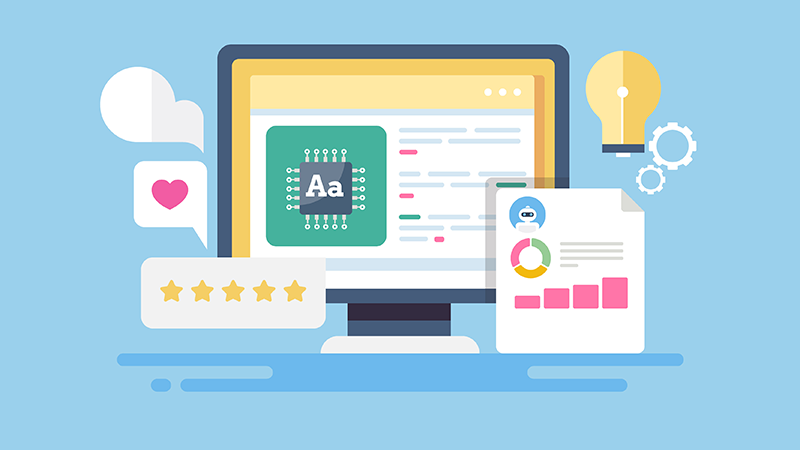Small business owners have never had more competition for their time. The days of casually posting on a Facebook or Instagram page and swimming in the organic traffic are long gone. Now, they have to balance prospecting, lead qualification, content creation, digital marketing strategy, and doing their business’s actual work. Many business owners find it impossible to keep up on their own. Thankfully, a new wave of marketing automation and artificial intelligence products have given small business owners more time to effectively run their businesses, serve more customers, and ultimately grow their revenue.
These marketing automation and artificial intelligence (AI) tools are advanced technologies designed to streamline your marketing and operations processes allowing you to engage with potential customers more effectively and efficiently.
In this blog post, we’ll explore how these tools can transform your lead generation strategy, offering practical insights and actionable tips to help your small business thrive.
Whether you’re a plumber, an HVAC technician, or a landscaper, you’ll learn how to harness these tools to keep your sales pipeline full and your business growing.
Leveraging Marketing Automation as a Business Owner
This can sound like an overwhelming concept. But, fear not, this is a comprehensive guide to the subject and by the end you’ll know the ins and outs of marketing automation, and how you might leverage it for your business.
But first – The basics of Marketing Automation. What is it, and how do you use it?
What is Marketing Automation?
Marketing automation refers to software and technology that automates repetitive marketing tasks, streamlines workflows, and measures the effectiveness of your marketing strategies.
They help users integrate marketing processes and allow businesses to target customers with automated email, web, social, and text messages, all without human intervention.
How Marketing Automation Works
A wide variety of tools and programs can be used in different parts of the marketing process. They all serve different purposes, but when used correctly, this tech stack will engage with prospects showing interest in your business delivering an unparalleled customer experience that helps turn internet visitors into new sales for your business.
Data Collection and Analysis
Data collection and analysis are all about gathering intel. These processes collect data on things like social media engagement, email responses, website traffic, and search engine performance.
This step must be completed. Understanding where your customers are, their behaviors, and preferences is critical. This knowledge allows businesses to make informed decisions and tailor their marketing strategies effectively.
Automation tools that help with these processes collect and analyze customer data from various sources and help present them in more easily consumable ways.
Leverage Google Analytics with Marketing Automation

Google Analytics (often called GA4) collects data from website visits and provides detailed insights into user behavior, traffic sources, and even conversion rates. It can also be integrated into various other programs and platforms to gather comprehensive data for analysis.
Familiarizing yourself with Google Analytics will go a long way to helping you understand how people find your business.
Segmentation
Segmentation divides your customers into smaller groups, or segments, based on criteria such as behavior, demographics, and interests.
From there, businesses can target their marketing precisely to ensure they send relevant and personalized content to the correct population. This way, marketing dollars are well spent, engagement increases, and conversation rates increase.
Automated Campaigns

An automated marketing campaign is triggered by specific actions taken by leads. These could include downloading a “lead magnet” resource or visiting a particular page on your website.
The automation saves time and ensures consistent communication with leads. It eliminates the need to schedule time to review responders and send out messages. Instead, you can let the system automatically nurture your leads and take them through the sales funnel without the need for manual work.
Automated campaigns can be used with just about any form of communication such as email, SMS text messaging, website chats, automated phone calls, and more.
Mailchimp and other email marketing platforms
Mailchimp is an example email marketing tool for businesses to set up automated email campaigns that trigger based on sign-ups, purchases, or abandoned carts. It also has a feature that allows the retargeting of ads and other automated marketing activities.
Lead Scoring
This process assigns values to your leads based on their interactions with your business. These values provide a qualitative method for determining their level of interest and likelihood to convert.
Lead scoring is a valuable tool for companies that produce a lot of leads at scale, or have longer sales cycles. When used properly, these systems can help your sales teams identify prospects that are ready to buy, allowing them to focus on your highest-value prospects at the right moment.
Marketing Personalization
Personalization is the process of taking collected data and using it to customize marketing messages and offers. This enhances the customer experience by making communications more relevant to each person, boosting engagement, conversions, and loyalty.
Dynamic Yield
Dynamic Yield is an AI-powered service that personalizes marketing messages. It creates tailored experiences for different segments across different marketing channels.
Multi-Channel Integration
Multi-channel integration ensures that marketing efforts are coordinated across all of your business’s marketing channels, whether web chat, SMS, email, or social media.
The result is a consistent experience for your leads, wherever they may be. It also means you can reach potential customers via their preferred channels.
Salesforce Marketing Cloud
Salesforce Marketing Cloud is a service that integrates web chat, SMS, email, social media, and other marketing channels into one. This lets businesses engage prospects in an organized fashion across different platforms for a seamless customer experience.
Benefits of Marketing Automation
Consumers today expect immediate answers to their problems, businesses that leverage marketing automation reap the benefits of this technology by delivering an unparalleled level of customer engagement, helping them close more of these prospects into paying customers.
24/7 Lead Generation and Nurturing
Marketing automation ensures that your business is always active, capturing and nurturing leads outside regular business hours.
Automated systems can send follow-up emails while you are on the road, respond to inquiries while eating dinner with your family, and engage with prospects through chatbots or SMS while at your kid’s soccer game.
This system in place means no lead goes unanswered and increases potential conversions by keeping prospective customers engaged and moving them through the sales funnel.
For example, suppose a prospect downloads a coupon at midnight. An automated email can be sent immediately, thanking them and suggesting further relevant content. This can help maintain their interest and guide them towards a purchase, all without the need for human intervention.
Enhanced Customer Engagement
Marketing automation also allows businesses to make the customer experience more personalized and cohesive. It allows for greater consistency across multiple channels, all while harvesting key information from these prospects, such as their name, cell phone number, email address, and more.
Automation platforms can integrate customer data from various sources to tailor messages and offers to individual preferences and behaviors. This helps customers feel valued and understood, leading to higher engagement and conversion rates.
For example, suppose a customer frequently visits a particular product page. The system can trigger personalized emails with special offers and even product recommendations related to their search. This enhances the customer’s sales journey and increases the chances of conversion.
Increased Marketing Efficiency
Automation drastically reduces the time and effort required to perform mundane, repetitive tasks like sending emails, updating social media, or segmenting prospect lists.
Businesses can save valuable time and resources by automating these processes. This allows them to focus on more strategic activities like planning, creativity, and data analysis
This increased efficiency improves productivity and enhances the overall effectiveness of marketing campaigns, leading to better results and a much higher ROI.
Marketing Automation Example
Imagine “Smith’s Plumbing Services,” a small plumbing business.
Smith’s Plumbing uses marketing automation to collect data from its website and social media accounts. It also uses tools to help segment its customers based on interactions and send personalized email campaigns to previous customers, offering discounts on routine maintenance.
When a lead visits their website and fills out a service request form, the automation system scores the lead based on their interaction history. If the lead’s score is high, an automated SMS is sent to schedule an appointment.
This ensures that Smith’s Plumbing takes advantage of every opportunity to engage with potential customers, even outside business hours.
Understanding the Stages of Lead Engagement
Understanding the stages of lead engagement is essential for effectively nurturing prospects and guiding them through the sales funnel. Each stage represents a different level of interest and interaction with your business, requiring tailored marketing strategies to move leads closer to conversion.
Here’s a brief overview of the key stages:
Mildly Engaged Lead
Initial contact and interest shown by the prospect.
Example: “Green Thumb Landscaping” notices that a potential customer has visited their website twice in the past week and read a blog post about spring garden maintenance. Although she hasn’t filled out any forms or requested a quote, her repeated visits indicate a mild interest.
Automation Qualified Lead (AQL)
Prospects that meet specific criteria set by automation tools.
Example: A prospect named “Sarah” downloads a free e-book on garden design tips from Green Thumb Landscaping’s website. This triggers the automation system to classify her as an Automation Qualified Lead, because she has engaged a lead magnet.
Marketing Qualified Lead (MQL)
Prospects with interest and engagement that show they are ready for more significant marketing efforts.
Example: After downloading the ebook, Sarah subscribes to Green Thumb Landscaping’s newsletter and fills out a form on their website indicating she would be interested in exploring some landscaping options for her home. Her continued engagement and interest make her a Marketing Qualified Lead.
Sales Qualified Lead (SQL)
Leads ready to close!
Example: Sarah requests a personalized garden design consultation through Green Thumb Landscaping’s website and is in their service area. This action tells us that she is seriously considering having services done, so she is passed on to the sales team as a Sales Qualified Lead.
Utilizing Marketing Automation Platforms
Not all automation tools are standalone products. Many of them are baked into platforms that provide multiple services together that come pre-integrated.
These powerful platforms enable businesses to streamline their marketing efforts, improve lead management, and ultimately increase revenue without the complexity of buying and managing all of the services separately.
Below are some examples of the benefits of using an automation platform:
Automatic Lead Storage and Engagement
Many of these platforms store and manage leads for you. This can help ensure your potential customers are accounted for in your marketing, leaving no potential customers behind.
Keeping this information centrally located helps maintain organized and up-to-date records. The result is more productive conversations with your prospects, helping you close more sales.
Nurture Campaigns
Many platforms can use multiple tools to help build a relationship with a prospect and convert them into customers.
For instance, if a lead downloads an ebook, the platform can trigger follow-up emails or marketing signals that provide additional resources, tips, and offers related to the e-book’s topic.
Stage Analysis
Using a single platform makes identifying bottlenecks or drop-off points easier by analyzing how leads progress through different sales process stages. For example, There will always be a drop-off after each stage. Still, if many leads stall at the “proposal request” stage, it might indicate a need to improve that part of the process or offer additional incentives.
Performance Metrics
Marketing automation platforms provide metrics and reports on conversion rates, lead sources, and campaign effectiveness. These insights help businesses understand which strategies are working and where improvements are needed, enabling continuous optimization of marketing efforts.
Depending on the capabilities of the marketing automation platform, some can even score and track each salesperson’s close rates, engagement with prospects, and closed revenue helping you as the business owner identify areas needing improvement.
Retention and Upselling
Marketing automation isn’t just for new leads! You can also use it for customer retention and upselling. Many of these platforms also serve as customer retention management systems that will allow you to leverage data from the sales process into the customer service and retention process.
These platforms allow you to use automated systems to target existing customers with loyalty programs, special offers, product recommendations, and even service renewals. This encourages repeat business and increases the customer’s lifetime value.
Automate Your Marketing, Close More Sales
This is a complex process, but this guide should have covered much of what you need to get started. If you still have any questions on marketing automation or AI, connect with City Ranked today!

